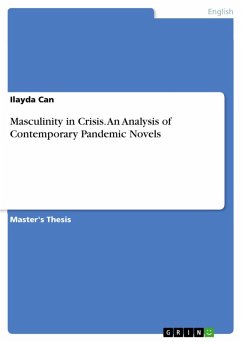Master's Thesis from the year 2022 in the subject American Studies - Literature, grade: 1,6, University of Flensburg, course: American Literature, language: English, abstract: The objective of this thesis is to examine the portrayal of masculinity in contemporary pandemic novels. Specifically, it aims to highlight the positive aspects of male characters and counteract their general neglect. It will also explore how men's private and public performances during a pandemic impact society. The thesis begins with an introduction outlining the context of the COVID-19 pandemic and society's response to it, highlighting the role of pandemic fiction as an analogy and familiar routine in times of crisis. It then argues for the necessity of examining the representation of masculinity in pandemic fiction, as existing research predominantly addresses feminist theories, with the analysis of men being either secondary or nonexistent. It also emphasizes the need to consider both negative and positive aspects of masculinity. The thesis then discusses the definition of 'masculinity' and highlights the necessity of rereading literature from a male perspective. It investigates the portrayal of masculinity in the novels 'Station Eleven' by Emily St. John Mandel, 'Severance' by Ling Ma, and 'The End of Men' by Christina Sweeney-Baird, focusing particularly on the impacts of men's private and public performances during the pandemic. Finally, it stresses the necessity of a complete examination of gender dynamics to broaden the definition of masculinity and challenge patriarchal norms.
Dieser Download kann aus rechtlichen Gründen nur mit Rechnungsadresse in A, B, BG, CY, CZ, D, DK, EW, E, FIN, F, GR, HR, H, IRL, I, LT, L, LR, M, NL, PL, P, R, S, SLO, SK ausgeliefert werden.









